
Alders are trees that compose the genus Alnus in the birch family Betulaceae. The genus includes about 35 species of monoecious trees and shrubs, a few reaching a large size, distributed throughout the north temperate zone with a few species extending into Central America, as well as the northern and southern Andes.

Baccharis is a genus of perennials and shrubs in the aster family (Asteraceae). They are commonly known as baccharises but sometimes referred to as "brooms", because many members have small thin leaves resembling the true brooms. They are not at all related to these however, but belong to an entirely different lineage of eudicots. B. halimifolia is commonly known as "groundsel bush", however true groundsels are found in the genus Senecio.

Acmella is a genus of plants in the family Asteraceae, described as a genus in 1807. It is native to the Americas and has been introduced to Asia, Africa, the Pacific islands, and Australia.
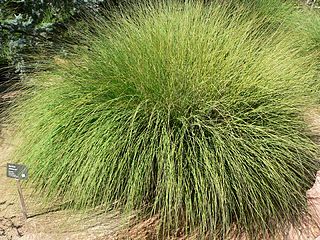
Muhlenbergia is a genus of plants in the grass family.

Pectis is a genus of flowering plants in the family Asteraceae described as a genus by Linnaeus in 1759.

Flaveria is a genus of plants in the family Asteraceae. They are sometimes called yellowtops. Some are annual or perennial herbs and some are shrubs. They bear yellow flowers in heads, with zero, one, or two ray florets in each head. These plants are found in the Americas, Asia, Africa, and Australia.
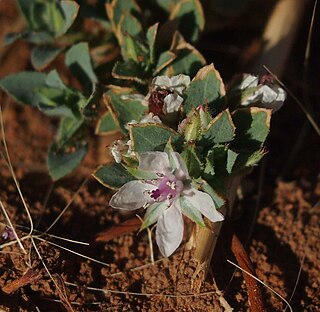
Bergia is one of the two genera of plants composing the waterwort family, Elatinaceae. These are tropical to subtropical plants and sometimes aquatic in nature.
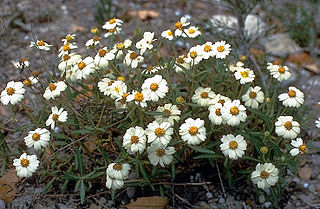
Millerieae is a tribe of flowering plants belonging to the Asteroideae subfamily. Of all the genera, only Galinsoga, Guizotia, and Sigesbeckia have species native to the Old World.

Lasiacis (smallcane) is a genus of Neotropical plants in the grass family, found in the Americas from Mexico and Florida south to Argentina.
Leptothrium is a genus of African, Asian, and Neotropical plants in the grass family.

Gymnosperma is a genus of flowering plants in the family Asteraceae. The only known species is Gymnosperma glutinosum, also known as gumhead, which is native to Mexico, Guatemala, and the southwestern United States.
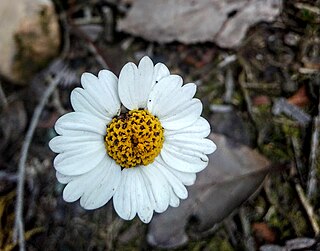
Sabazia is a genus of Colombian and Mesoamerican plants in the tribe Millerieae within the family Asteraceae.
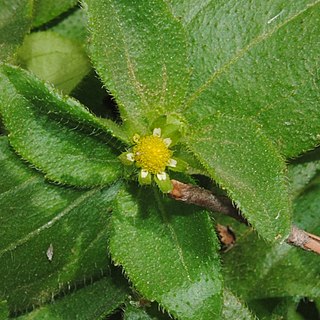
Jaegeria is a genus of flowering plants in the family Asteraceae found from Mexico to South America. The name commemorates Georg Friedrich von Jaeger.

Rhodymenia is a genus of red algae, containing the following species:

Acmella uliginosa, the marsh para cress, is a species of flowering herb in the family Asteraceae. The plant is native to South America and is naturalized in parts of Asia and Africa.
Flaveria linearis, known as narrowleaf yellowtops, is a North American plant species of Flaveria within the family Asteraceae. It is native to Florida, Cuba, Bahamas, and the Yucatán Peninsula of Mexico.
Asteromyia gutierreziae is a species of gall midges in the family Cecidomyiidae.

Lasiopetalum glutinosum is a species of flowering plant in the family Malvaceae and is endemic to the south-west of Western Australia. It is a spreading, multi-stemmed shrub with densely hairy young stems, egg-shaped leaves often with three lobes and bright pink or dark red flowers.

Pholiota glutinosa is a species of poisonous fungi in the genus Pholiota, endemic to New Zealand.















